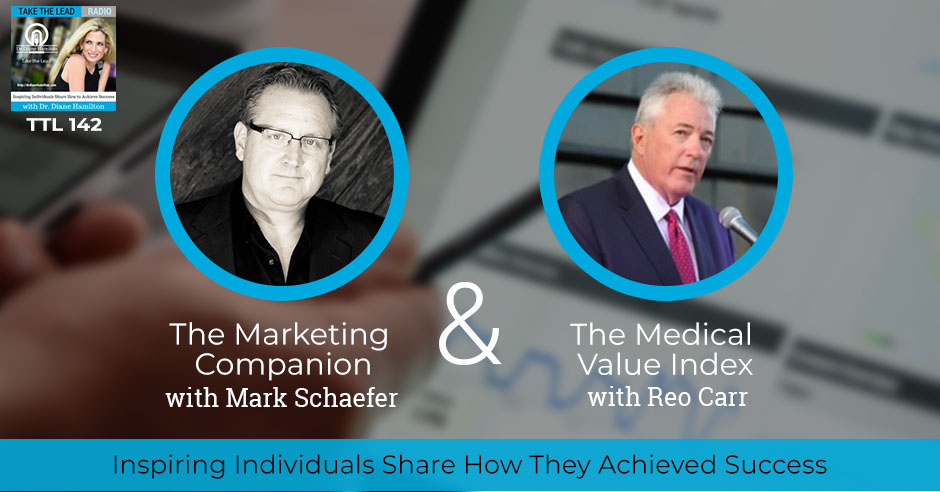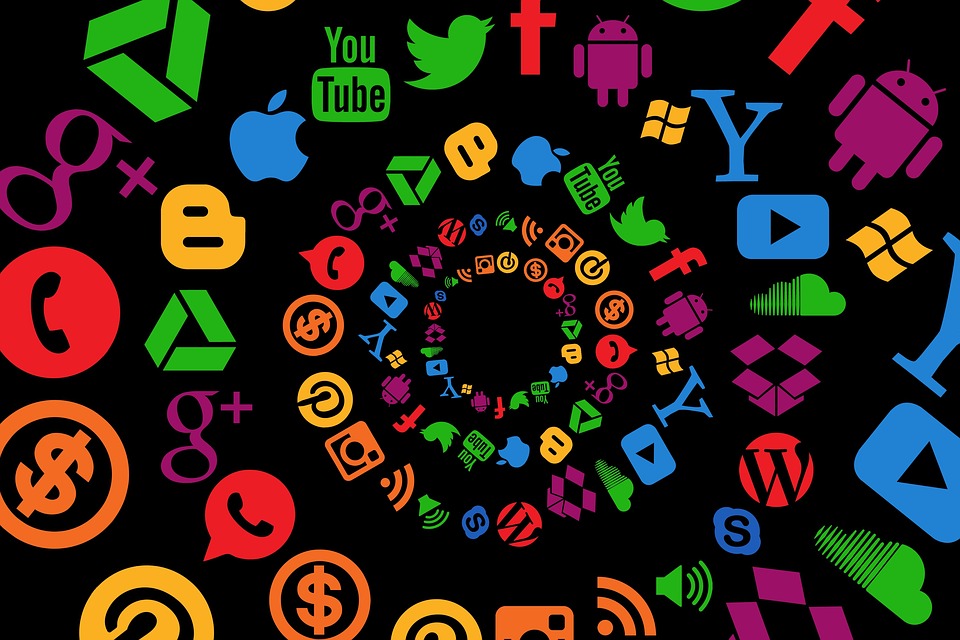Social media has connected the world in this digital age and it is on the verge of disrupting industries. As a marketing companion and strategist, Mark Schaefer looks at social media workshops as a way to keep up with the disruption. He shares how China is leading America in terms of using and regulating this space of digital technology. We determine almost everything in the world with price and quality, a component which is currently not present in healthcare. To solve this, Reo Carr and his partner developed the Medical Value Index, a free online tool that help patients determine the best value of healthcare in a hospital setting.

We have Mark W. Schaefer and Reo Carr. Mark is a globally recognized blogger, speaker, educator, and consultant. You’ve probably seen him everywhere, Wall Street Journal, Wired, New York Times, the list goes on and on. Reo is Founder and CEO of Research Group of Companies. He’s the former Editor in Chief of California Business Journals. He’s involved in Physicians News Network. He’s got a lot of industries in which he has dabbled.
Listen to the podcast here:
The Marketing Companion with Mark Schaefer
I am with Mark Schaefer who is a globally recognized blogger, speaker, educator, consultant, and author who blogs at Grow, one of the top marketing blogs in the world. As Executive Director of US-based Schaefer Marketing Solutions, he specializes in marketing strategy and social media workshops. He’s got a list of who’s who for clients and he’s one of the top marketing podcasts on iTunes. He’s the seventh most mentioned person by CMOs on Twitter. The list goes on and on. I’ll let you discuss some of the other things you do as we talk, but the way I found you was through your book, Known, which is fascinating. I’m so glad to have you. Welcome, Mark.
I’m delighted.
I’m fascinated by your podcast. What’s the title?
I’ve been doing The Marketing Companion for about four and a half years with my great friend, Tom Webster. Tom is not only a brilliant man and an experienced business person as Vice President of Edison Research, he’s also hilarious. We describe our show as the most entertaining business podcast. We just can’t help that because every show, our goal is to crack each other up. We do all kinds of crazy things. We introduce these products that we make up. Our most famous product is Google pants, like voice-activated pants. That one got a little racy. To be honest, maybe that’s why it was so popular. We do have a lot of fun. The podcast is in the top 1% of podcasts and so we’re happy about that.
I liked your, “Is Facebook Evil?” podcast. I was listening to that for a little while and I didn’t want to turn it off because I was fascinated in some of the stuff you guys cover. You have an interesting background and you do a lot of research. The stuff you guys are playing around talking, but it’s serious stuff you’re talking about. You are a faculty member at Rutgers, so you’ve got advanced degrees. You have an impressive background. I was listening to your show and fascinated by your discussion about Tencent and what they’ve done recently. You want to talk about that? People would be fascinated by your insight into that.
One of the most significant occurrences in marketing, maybe arguably even in business, in the last year or so occurred just went over a lot of people’s heads. The Chinese business titan, Tencent, purchased 10% of Snapchat’s parent company, Snap. This is significant for a couple of reasons. First of all, Facebook tried to buy Snapchat and they were turned away. The other reason this is significant is because there is no global social media network. The biggest population in the world is in China. Facebook isn’t even available in China.
I just got back from Russia doing a workshop in Russia. Facebook is the number four or number five most popular social network and in Russia. They don’t even use Google over there. They have their own search engine. As you go around the world, social media is regionalized. This is very interesting that this Chinese giant company is reaching over to America and creating a stake in an American social media company. That’s interesting and it could be the first step in creating some global network, so I thought it was significant.

I know that Zuckerberg has tried to get into China and other areas. Why do you think they haven’t been able to?
Number one, they’re protecting Tencent. Number two, American-style free speech is not that popular over there. Zuckerberg has probably spent more time in China than any other country outside the US and has had made zero progress, so we’ll see.
Did you say they had much more interesting apps over there? Why do you think that is?
They’re so far ahead of America that the leading social media application over there is called WeChat where you can do everything you could do on Facebook, plus everything you can do on YouTube, plus everything you could do on LinkedIn, plus everything you can do on Uber, plus everything you can do on Twitter, plus order your dry cleaning, buy your groceries, and pay for your clothes at your favorite clothing store. It’s everything in one place.
Why don’t we have that then?
We don’t have that because the way the American system has grown up is that every social network has created its own niche. We have LinkedIn for business. We don’t need another network that does business because we have LinkedIn. About five years ago, Facebook tried to take on LinkedIn. They created this thing that was called Branch Out or something like that. It totally bombed. Who needs it? We’ve got LinkedIn. Facebook is trying everything it can. Twitter doing everything it can to ramp up video and video sharing. Videos don’t go viral on Facebook. They go viral on YouTube because that is the video channel. We’ve got these silos in America, and silos are well established. Unless there are mergers and acquisitions, it’s going to stay that way.
Do you expect that we could get those?
To some extent, eventually, Snapchat will be owned by somebody else. Twitter will be owned by somebody else. LinkedIn is already owned by Microsoft. I do think there’ll be some consolidation. If somehow WeChat started to become more popular in America and other parts of the world, then you’d see a real push from Facebook to try to catch up and consolidate.
You had talked about a research study from somewhere in Southern California where in 1985, they found that 18% of people that were in the school that they kept monitoring felt overwhelmed by life, but now we’ve got it up to 41% or something to that effect. If these students are feeling so overwhelmed by social media, they can’t keep up and technology is outpacing this health regulation and government regulation, are they seeing that in China? Are they tracking that there? Are we getting to be like Star Trek where they wore that thing on their eye the whole time and did not want to take it off? Is it going to be like that?
I would say that America is dramatically behind the rest of the world in terms of how it is looking at technology and regulating technology. For example, in Germany they’re suing Google. They sued Facebook for privacy violations. Facebook and Google are doing the same things here in America. I don’t know why but we just shrug our shoulders, and like, “We like free stuff.” It was about three years ago, there were protests in the streets, in the Netherlands, in France, in Germany, about some of these privacy violations. Facebook has tried to merge people’s profiles on WhatsApp, which they own, which is the number one messaging service in the world, and their own to create these super user profiles.
Germany said, “No, you’re not. Have you asked your users if that’s okay?” South Korea is regulating the amount of time people can spend on video games. They had people dying in South Korea because they wouldn’t sleep, they wouldn’t eat. This video game addiction is a big deal. There are two hospitals in Germany completely dedicated to video game addiction. The treatment program is nine months. It’s a big deal. There is going to be a backlash of eventually.

Once some of the digital natives start getting elected to government, they see what’s going on. They know what’s going on. Look at the people in the US Congress. They’ve never made a Facebook post in their life. They probably have some staffers doing it and they’re completely out of touch with technology. In the last presidential election, neither candidate’s platform had anything around internet, internet security, digital proficiency, anything like that. I can’t explain why it’s not more on the agenda in America other than it’s not affecting anybody’s pocket books right now, but it is an area ripe for regulation.
With Trump using it so much, that’s got to have some impact.
It does. If it has any impact at all, it shows how powerful social media is, particularly how powerful Twitter is. Twitter seems to be overlooked sometimes because it’s not that popular on Wall Street, although they just did have a blockbuster third-quarter earnings statement. Twitter isn’t Facebook. Twitter isn’t YouTube. It’s not millennial-sexy like Snapchat, but Twitter has 330 million active users around the world. It’s bigger than Snapchat. It’s the third biggest social network. There are a lot of opportunities for business.
I also had just come out with the fourth edition of a book called The Tao of Twitter. It’s the bestselling book on Twitter in the world. The question I had to answer is what is twitter today? What does it mean to the world today? Is it just a place where people promote links and they have all these political harsh debates? What I found was totally awe inspiring. There’s no other word for it. People are connecting, collaborating, making friends, solving problems, playing games and having meaningful debates on Twitter.
There’s no other place like it. It’s time for businesses to take a fresh look at Twitter. There’s a huge opportunity there. I’ve been at marketing more than 30 years and marketing on Facebook successfully is one of the hardest things to do and has become harder year by year by year. There’re some opportunities both professionally and for business people looking to help grow their businesses on Twitter.
That’s interesting because it’s very challenging for people to know how much to post on certain sites, and I had the CEO of Meet Edgar on my site and different people like that, and I think some of these set-up, pre done postings are just becoming super popular because people want to have content out there and they don’t want to have to do it five times a day or even think about it. You see a lot of these motivational things all that long.
I call it the rainbow bombs. If you can dream it, you can be it. To some of these things, I say, “Did you even think about what this says?”
I’ve tried to get into it. I can’t embrace that because it’s just not my personality. There’s so much stuff out there that I feel like people are all talking out, but nobody’s communicating in some ways. I would love to see what you found out. Nobody’s looking. They are just liking so other people think they’re liking. How do you get past that and get into the meaningful stuff that you were talking about?
There have been a couple blog posts written recently about is Twitter even relevant anymore? That is certainly the tone and the perspective in the social media marketing bubble. These are the people that write all the same blog posts over and over again. They write the same opinions over and over again. You start to believe it, but that’s not necessarily what’s going on in the real world. If you look outside that social media bubble, sometimes I’m in an alternate universe where people just think things.
I’d come from a background where I worked 28 years for a Fortune 100 company. I’ve worked with some of the biggest brands in the world. I’m immersed in real business. I’m immersed in companies that make stuff. You go into social media marketing and it’s not even real sometimes. The discussions are not based on reality. Some popular blogger will say something that becomes the truth, but it’s not the truth. Often, sometimes it is.
Marketers need to get out of marketing and get into their customers. They need to get in a car and go visit people or get on the phone and talk to people and see what’s going on in the world. That’s what I had to do when I did this new edition of the book. I got out of the bubble and I looked at what is going on with Twitter. What is the reality today? It is absolutely part of the fabric of people’s lives for millions and millions of people.
It’s their favorite social network. It’s where news breaks, it changes lives, it changes career. It’s part of our popular culture that you cannot see a live award show or sports programs or news program without reference to something that’s been on a Tweet. It’s a vital and exciting network. My last edition came out in 2014 and what else is Twitter has added a lot of cool new functionality that’s made it even more fun. I left it alone for awhile too, but it’s a lot of fun.

What have they added that you like?
One of the things that’s cool is I kept seeing that Twitter has made these deals with different television shows like the NFL and an awards program. Twitter says, “Come watch this football game on Twitter,” and I’m thinking, “Why would anybody want to watch TV on Twitter?” until you do it. What they do is you watch the show and there’s a live Twitter stream of people commenting right beside it. It’s hilarious. It’s double the entertainment.
It’s a fascinating thing because I wrote a brand publishing course when I was the MBA Program Chair at Forbes. I worked a lot with the Forbes guys on the different types of social media and different things. I’ve seen some of the challenges with some of these. A lot of people see Twitter as movie stars saying what they ate still even though you would think at this point that they would know it’s changed. How do we get people past that?
Maybe they will, maybe they won’t. Part of the thing that’s been an obstacle for Twitter is that it’s quirky. It has its own rhythm. It has its own language. It’s a little intimidating to figure out what should I post, what’s this hashtag thing, what’s this “@” sign for, what’s a re-tweet? That’s what my book is for. It’s the user’s manual. 60% of the people who start using Twitter quit because it’s just too quirky. That’s why people love Twitter because it is their place. Snapchat is the same way.
Not everybody gets Snapchat, but the people who are on it, it’s their place. That’s what they love. Snapchat is never going to be Facebook. It’s never going to be YouTube. It is going to be the quirky little thing that digital natives love and Twitter is the same way. I’m not sure if Twitter will ever have the broad appeal like YouTube or Facebook has, but it can be a very vital successful social network. It already is. It’s just not making money like it should. Ultimately, it’s going to end up being part of something else.
What’s the appeal of Snapchat or Instagram as compared to doing something like Facebook?
There’s no cookie cutter answer for where businesses need to be. I’ve written a lot about this. Let me give you an example. Some businesses might come to me and say, “What’s social network should I be on?” You need to look at a lot of things. The number one thing you need to look at is every business needs some original content as its fuel. It has to be written, audio content like we’re doing now, video content like a video on YouTube, or some visual content like Infographics or something you’d put on Instagram or Pinterest.
You have to look, first of all, at what you love to do. You have to look at what your competitors are doing. Where are your customers? If you’re in the fashion business or you do something with home decorating, cooking, or fashion, you need to be on Pinterest. If you are in a highly technical business where you’ve got to have detailed instructions on how to use your product, you need some written content. If you like how-to things, like how to make something, how to bake something, how to fix something, if that’s your business, then you’ve got to be on YouTube.
You can be successful anywhere, but you have to get focused on what you love to do, what’s going to bring you joy. If it doesn’t bring you joy, you’re going to quit. If you can’t quit, people are going to know that you’re bored. You’ve got to do something that’s going to be fun. You’ve got to do something that’s relevant, interesting, timely, and maybe even a little entertaining. You have to be consistent. Don’t be overwhelmed. Pick one thing. Do a podcast. Do photography. Do video. You don’t have to be everywhere. Pick one. Then you have to look at things like Facebook, Twitter, YouTube, and LinkedIn. Those are the distribution channels for content. Figure out what is your one source of content then figure out what’s the distribution channel is going to be. The most important is start it and stick with it because it only works if you do it consistently.
I’m curious where you post your podcast. Which social media do you use for that?
I want to go back a step and say I started out as a blogger. I blogged for five years before I started my podcast. Again, because I want to demonstrate that this is important, I established my audience in one place on my blog before I ever made a decision to diversify into podcasting. I started my podcast and now my audience came with me. I had a built-in audience for the podcast. The main, by far, where we get most of our traffic for the podcast is through iTunes. There are about five other smaller channels out there that are still relatively insignificant, but iTunes is where we get almost all of our traffic.
Maybe I’m wrong, but does iTunes give you that data? I was told you can’t find out how many people are listening through iTunes.
There’s a publishing system called Libsyn. You get the download information from Libsyn and they’re going through a lot of changes. The IAB in New York, it’s the organization that standardizes advertising processes and procedures, is cracking down on podcast because a lot of the numbers are inflated. Libsyn is going through a lot of changes and most people are going to get a haircut. They’re going to get a buzz cut. It’s not popular because some of these podcasts got sponsors based on how many downloads they have. A lot of those downloads are going to be going away because it’s artificially inflated. iTunes has pledged to start providing better statistics.
I’ve heard that, but I didn’t see it coming.
I don’t think it’s been out yet.
Mark, everything you do is all the stuff I’m interested in. I want to make sure that everybody was able to find out more because you’ve written so many books, you have so much content out there. How can people get more information about you?
I’d love for your listeners to stay connected to me and the best way to do that is to take a look at my website which is BusinessesGrow.com. There you’ll find my blog, my podcast, my books, all my social media connections, and lots of other cool resources for businesses of any size.
I appreciate it and I love your book, Known. I’m going to read your latest book on Twitter. Thank you so much.
Thank you. It’s been an honor, Diane.
You’re welcome.
The Medical Value Index with Reo Carr
I’m with Reo Carr. He’s the Founder and CEO of Research Group of Companies which is a media services company serving the healthcare industry. Reo also serves as Publisher and Editor-in-Chief of the Physicians News Network. Your bio is so long, but I wanted to make sure that people know you’re also the former Executive Editor at California Business Journals. You’ve done just about everything. Welcome, Reo.
Thank you, Diane. It’s a pleasure to be here.
You’re always a fascinating guy to me. You’ve got your hands in a lot of different businesses. You’re in the business journal, editing situation, you’re in media. Now you’ve got this background in medical as well. How’d you get interested in the medical healthcare industry?
I’ve been involved in healthcare for a number of years. When I was with California Business Journals, we covered a number of healthcare-related issues. I live and work in the San Diego, California area. Through the California Business Journals, we launched a number of healthcare-related events to recognize excellence in healthcare in San Diego County. I also work with a physician business partner to develop something called the Medical Value Index which is a tool to help prospective patients to determine where they can get the best value in healthcare in a hospital setting. That’s a tool we’re still developing.
We are hoping to roll it out soon, so that people who want to have surgery will have a clinically-based reference for healthcare value that is price plus quality. That’s how we determine almost everything else in the world that we buy. It is around value. Whether it be a new car or needing clothing, we look at the value related to it. This is a huge missing component in healthcare. We’re intending to correct that with the introduction of a tool. It will be an online tool and it will be available for a fee to patients. They will put in their diagnosis from their physician and we will be able to tell them what hospital can give them the best outcome at the best cost in their community.

I was a pharmaceutical rep for a long time and my husband is a physician. Say you like a doctor in one part of town, but you find out that he doesn’t have privileges at the hospital that gives you the best results, do you find a new doctor? Do you find a new hospital?
We have data on more than 3,000 hospitals in the United States. We looked at lots and lots of data and we do a deep dive. What we found in our research, and since your husband is a physician, you probably know this, Diane, but you can have a fabulous doctor but if the hospital system is not supporting the doctor’s work properly with the post-operative care, then the physician’s work can often be undermined by the hospital staff. With the physician being the team leader, it’s the entire team of care or train of care that is so important to the patient outcome.
What we look at is the entire system of care for patients. For example, a patient got a pretty common surgical procedure today, joint replacements, knee or hip replacements. As we’re aging, more and more people are getting their joints replaced, so we can look in your community and tell you where you’re going to get the best outcome statistically based on the data that we have, at the best price, the value equation.
It’s where we think healthcare is going. We’re all paying a lot more for healthcare. One of the quiet underlying trends in healthcare has been the slow transfer of risk from the insurance payers, from the self-insured employers to the individual. We see this in terms of higher deductibles that we’re carrying more of the risk. It’s not uncommon today for a family of four to face $10,000 or $15,000 worth of deductibles in the course of a year for their healthcare for their family. $2,500 to $5,000 a person is not uncommon for a family of four and that’s cash out of pocket. Increasingly, we have to train people to be healthcare consumers. We can’t just depend on the healthcare system and that’s what we’re focused on.
It’s interesting that you say that because I haven’t been a pharmaceutical rep for a long time; it’s been over fifteen years. It wasn’t so much back then that the advertising was aimed at the consumer as it is now. Now consumers are going to their physician saying, “I saw this advertisement and I want this.” Is there any downside to giving the consumer this information directly from the companies?
I want to make it clear, I’m not a physician. I never wanted to be a physician. I work extensively with physicians. I have numerous business partners and associates who are physicians. Physicians News Network reaches over 30,000 physicians a week. I’m entitled to a lot of doctors, and what doctors worry about with all this is their ability to guide care for their patients is slowly being reduced that they can’t care for their patients the way that they want to.
We’re not interested in getting in between the doctor-patient relationship, but we are interested and we do recognize that healthcare is costing us individually a lot more. People are looking for value in the case of this particular concept. That’s what we’re trying to address, but the doctor patient-relationship is sacrosanct. We respect that and want to do everything we can to support that.
I know a lot of doctors who are always frustrated because they’d have people come in, they give them advice, and then no one would take their advice. They just want a pill to feel better. Since I’ve left, I’ve seen a lot more focus on eating better and better health. Do you get involved in the food is medicine argument at all? What do you have to deal with that?
Research Group, my company also publishes on behalf of an organization called the Nutrient Institute which is a non-profit that exists to promote public understanding of nutrition and particularly the importance of nutrients in our diet. We hear a lot about proteins, carbohydrates, and fats and all these kinds of things. In the whole scheme of things, the concept of nutrients gets lost. The Nutrient Institute is focused on educating the public about the importance of nutrients, and we provide publication services to the institute. I have been very involved in nutrition and nutrients. I’ve been interested in it all my life.
I’ve been getting educated on the importance of nutrients. Food is medicine. Food is the first line of good health. The more we study this, the more we understand how important food is to our overall well-being. There’s a whole trend in medicine today or in health around gut health, how our gut and the microbiomes in our gut affect our overall health? There is a greater understanding of that and food, where it should go after we eat it. It goes into our gut, and that has a big impact on our overall health.
My husband and I went out to dinner with Naveen Jain who has got the company Viome which is all based on gut, curing things through the gut. What I think is interesting is he was saying that we think of our brain as the main major organ and then the gut secondly. He thinks eventually, we will think the other way around, that your stomach is what makes you healthy and the factor behind all of these diseases. Do you agree with that?
The evidence is mounting towards that conclusion. There is a very strong brain-gut relationship. Yes, we are seeing that.
It’s good to see a lot more focus on what we can do. Are you dealing on anything with the GMOs? What do you think of that? Is that something you think is causing some of these problems with the nutrients?
Genetically modified organisms, I don’t feel qualified enough to discuss that in any detail. I haven’t been involved in its science.
You deal with all kinds of biosciences. You are Director of Pediatric Bioscience, aren’t you? Or were you in the past?
I was a board member of the Board of Directors for a company called Pediatric Bioscience, which was focused on developing a diagnostic tool to determine the likelihood of women having autistic children prior to their getting pregnant. It was a very interesting concept.
You have done a lot in innovation in healthcare. You’ve done so many different things. You publish this Nutrient Science News. You’ve combined all these things. You’ve got your publishing, your research, your medical. How did you get into the media to begin with? How did you get involved with the California Business Journals?
My first job as a reporter was a stringer, that’s a part-time freelance writer, for a daily newspaper in Watsonville, California. I was writing about agriculture. I worked for some time in my life in farming and agriculture, and so I have a strong background in that area. It’s not reflected in my resume that I sent you, but one time I did that. That’s how I got started as a journalist. Like most journalists, we worked our way up through the system until I became Editor-in-Chief of a couple of different newspapers. That’s my journalistic background.
Along the way, I got involved in healthcare through some chance meetings with doctors and some editorial work I did with hospitals in the San Diego County area. I would bring together all the hospital CEOs every year for a discussion. I got more and more involved in healthcare and that’s what drew me into launching Physicians News Network. As the name implies, we are focused on news for doctors. Our focus for PNN is to give doctors a non-clinical news product. They get lots and lots of clinical information.
We’re focused on independent physicians and helping them survive as independent physicians, which if you have doctors in your family is extremely challenging today. The doctors are under enormous duress. If you draw a little box in your head and in one corner is hospitals, one corner is insurance companies, one corner is government, and one corner is the doctor, and the doctor’s voice is largely lost in that relationship. By the way, all the players in that box are fighting about money constantly.
It’s a business. Sometimes you don’t look at it that way when you go to the doctor. You forget that these guys are entrepreneurs. They have the same issues as a business because they are one. Patients fail to look at it that way. If you’re a doctor, you certainly have to look at it that way. They need to give more training to doctors in school. They have so little business education. I was looking at your education by the way. You went to Stanford, Berkeley, and San Jose. How many degrees do you have?
I don’t have nearly as many degrees as you have. I have a couple of bachelor’s degrees and a master’s degree. I grew up in the Bay Area.
I was counting how many boards you have served on and I ran out of fingers. How do you have time to serve on so many boards? Did you serve on multiple at a time or is this over the years?
I served on multiple boards at one time. I’ve reduced that a lot as you can see now. I used to serve on a lot of non-profit boards. I am now serving entirely on for-profit boards. Most of my board work is healthcare-related, although I am on the board and an investor in one education company.
Is that Kids Invent?
Yes.
I’m curious about that because I work as a board of advisor for Leader Kid Academy and they develop soft skills, emotional intelligence, and that type of thing in kids K through 12. What does Kids Invent do?
We are focused on developing math and science skills in primary age students through invention. We created the curriculum and we give kid problems. These are teacher-guided and we are classroom focused. We give kids problems to solve and then we give them the tools to do it. It’s very hands on. For example, we have them build a wind generator and an electric car. The wind generator will generate the electricity to power the electric car. They build all this. They learn how to do it. They learn the scientific principles associated with all of it and they have to invent it themselves. That’s why we call it Kids Invent.

Many kids don’t get to do hands-on things today. Their life tends to be in the screen as with a smart phone or the tablet. Our stuff is made of real live materials, everyday stuff. It’s simple to do but it’s very powerful. Our curriculum meets all US and California Advance State Standards for science education. We’re very proud of what we do. We have Kids Invent with about 15,000 children in California today, and we have sold the content or curriculum all over the world.
You’re based in San Diego. Do you have to go around other areas? Are you primarily located there?
I do some travel. Kids Invent, for example, is based in Northern California. Today, we do so much work on the telephone and via teleconferencing. Travel has been greatly reduced. I’m a pilot. I love to fly, and I don’t get as much opportunity to fly anymore because it’s so much more efficient to handle it by teleconference.
I still laugh at thinking about this one time when we were sitting there and you’re looking out the window and you’re going, “That plane is this and that.” You knew all the different planes. Is there a plane you don’t recognize that flies around?
Not too many. That’s on one of my passions. I love aviation.
Have you ever had anything scary happen to you in an aircraft? Do you just get back in if that happens?
I have had a couple of scary things, although nothing that was potentially disastrous. I’ve had three occasions in near-miss mid-air collision. One happened over Las Vegas, New Mexico in the middle of nowhere on a perfectly clear day. An airplane came at me at a funny angle. He couldn’t see me because his wing was covering us up, and we almost hit. I had to take a violent action to move my airplane away from his. That has happened to me three times.
Where are the air traffic controllers in all of this? Don’t they follow the little planes? I don’t know much about it.
As I’ve done a number of times, you can fly all the way across the country and never talk to air traffic control. You have to stay at low altitudes. You have to stay outside of urban congested areas. It is possible today to fly in airspace in the United States uncontrolled. It’s very commonly done and it is very safe to do, by and large.
I didn’t know that. We had a couple of helicopters run into each other that we’re doing some news casting here a few years back. You can see how something like that can happen, but I didn’t realize that. It was so entertaining to me to see that you obviously love this and that’s awesome. At another time I met you, you attended this Forbes event where Steve Forbes was speaking. Weren’t you there as part of the business journal at that time?
At that time, I was still with the business journal. I saw Steve Forbes talk about his view of the world. It was very interesting.
I’m curious at your time with the business journal. You must’ve met some interesting people other than Steve Forbes who I agree was super interesting. Who are the most interesting people you got to meet through having that job? Did you have any names that stand out in your mind?
I met the CEO of Intel. He was a fascinating guy, and it was all the more so an interesting meeting because he and I were aboard an aircraft that is affectionately known as the Vomit Comet because it is an airplane that is used to train astronauts for weightlessness. We were going through a series of weightless experiences on this aircraft out over the Pacific. He and I got to know each other while I was reporting on it. I’ve also met a number of US astronauts.
I’ve gotten to know a number of them. Charles Bolden who is the immediate past head of NASA is one of the most fascinating guys I’ve met. He’s a now retired marine general, flew four space shuttle missions, and then became the Head of NASA. He was one of the most interesting people I met. I had dinner with Barack Obama three times. This was before he was elected President. He was a fascinating guy. He’s a very friendly and very smart.
You’ve helped me when I’ve asked you questions about business journal-related things in the past. I have a lot of audience who may find it helpful if they’re trying to have some activity that they’re trying to promote or do something where they’re trying to get the local business journal to pick what they’re doing. Do you have any tips or quick advice for them?
Make sure that what you are talking about is going to be newsworthy to other people. What you think is newsworthy often isn’t newsworthy to a newspaper. Look at what they’re publishing. Look at what they’re covering. Number two, find the reporter inside the newspaper who is covering the subject that is relevant to your interest and get to know that reporter. Communicate with him. Number three, when you communicate with the reporter, do so by email, follow up by telephone. Don’t be offended if they don’t answer or if they’re short with you. They’re very busy. Be persistent and be polite. It pays off in the long term.
A lot of people probably need to know more about that because now it’s so digital. You never know when you’re supposed to call, when you’re supposed to send, and how often. It’s getting more confusing. You were helpful to me when I asked you about it. A lot of my audience would probably find that very helpful. It was so fun to chat and catch up with you, Reo. I’m so glad you did this. I was curious to hear about your new healthcare-related business and all the things you’re doing. I’m sure everybody wants to hear a little bit more about that. When do you expect this program to be available?
The Medical Value Index probably won’t be available until midyear 2018.
How could they find out more if they want to reach you or learn more about what you’re doing?
They can find me on LinkedIn, Reo Carr. I’m happy to communicate with them. That’s probably the best way to find me.
Reo, thank you so much. It’s always a pleasure. I hope you get a chance to fly a little bit more. If you get here in Arizona, let me know.
Thank you very much, Diane. I look forward to talking to you soon.
You’re welcome.
I want to thank Mark Schaefer and Reo Carr for being my guests. Such great knowledge, great background on both of them and so different, everything that they do. What I love about this is I get such fascinating guests. No two have had the same content. They’re so different in what they’re interested in and that’s what I find fascinating because there’re so many aspects to leadership and to success and marketing and all the things we talk about.
If you’ve missed any past episodes, you can find them on iTunes and a lot of other areas. You can also go to DrDianeHamilton.com/Episodes, and we showcase everybody that’s been on the show there. We’re on Roku; we’re on just about every platform that you can think of. If you Google Dr. Diane Hamilton Show, you’ll find it everywhere.
About Mark Schaefer
 Mark W. Schaefer is a globally-recognized blogger, speaker, educator, consultant, and author who blogs at {grow} — one of the top marketing blogs of the world. As Executive Director of U.S.-based Schaefer Marketing Solutions, he specializes in marketing strategy and social media workshops. Clients include both start-ups and global brands such as Adidas, J&J, Dell, AT&T, U.S. Air Force, and the UK government. He is the co-host of The Marketing Companion, one of the top 10 marketing podcasts on iTunes. In 2015 Mark was the seventh-most mentioned person by CMO’s on Twitter and is among the Top 10 most re-tweeted marketing authorities in the world. He was listed as one of the Top 10 authorities on Social Selling by Forbes. Mark is a popular and entertaining commentator and has appeared on many national television shows and periodicals including the Wall Street Journal, Wired, The New York Times, CNN, National Public Radio, CNBC, the BBC and the CBS NEWS. He is a regular contributing columnist to The Harvard Business Review.
Mark W. Schaefer is a globally-recognized blogger, speaker, educator, consultant, and author who blogs at {grow} — one of the top marketing blogs of the world. As Executive Director of U.S.-based Schaefer Marketing Solutions, he specializes in marketing strategy and social media workshops. Clients include both start-ups and global brands such as Adidas, J&J, Dell, AT&T, U.S. Air Force, and the UK government. He is the co-host of The Marketing Companion, one of the top 10 marketing podcasts on iTunes. In 2015 Mark was the seventh-most mentioned person by CMO’s on Twitter and is among the Top 10 most re-tweeted marketing authorities in the world. He was listed as one of the Top 10 authorities on Social Selling by Forbes. Mark is a popular and entertaining commentator and has appeared on many national television shows and periodicals including the Wall Street Journal, Wired, The New York Times, CNN, National Public Radio, CNBC, the BBC and the CBS NEWS. He is a regular contributing columnist to The Harvard Business Review.
About Reo Carr
 Reo Carr is founder/CEO of Research Group of Companies, LLC (RGOC). RGOC is a media services company serving the healthcare industry. Reo also serves as publisher/editor-in-chief of Physicians News Network (PNN), a division of RGOC. PNN provides news coverage of non-clinical economic, regulatory and political events and trends of interest to independent physicians working across the full spectrum of medical specialities. RGOC also publishes Nutrient Science News for the Nutrient Institute. He is the former executive editor at California Business Journals.
Reo Carr is founder/CEO of Research Group of Companies, LLC (RGOC). RGOC is a media services company serving the healthcare industry. Reo also serves as publisher/editor-in-chief of Physicians News Network (PNN), a division of RGOC. PNN provides news coverage of non-clinical economic, regulatory and political events and trends of interest to independent physicians working across the full spectrum of medical specialities. RGOC also publishes Nutrient Science News for the Nutrient Institute. He is the former executive editor at California Business Journals.
Important Links:
- Mark W. Schaefer
- Reo Carr
- Physicians News Network
- Grow
- Schaefer Marketing Solutions
- Known
- The Marketing Companion
- Tom Webster
- Edison Research
- Is Facebook Evil?
- Rutgers
- Tencent
- Snap
- The Tao of Twitter
- Meet Edgar
- Libsyn
- BusinessesGrow.com
- Nutrient Institute
- Naveen Jain
- Viome
- Pediatric Bioscience
- Kids Invent
- Leader Kid Academy
- Steve Forbes
- Reo Carr on LinkedIn